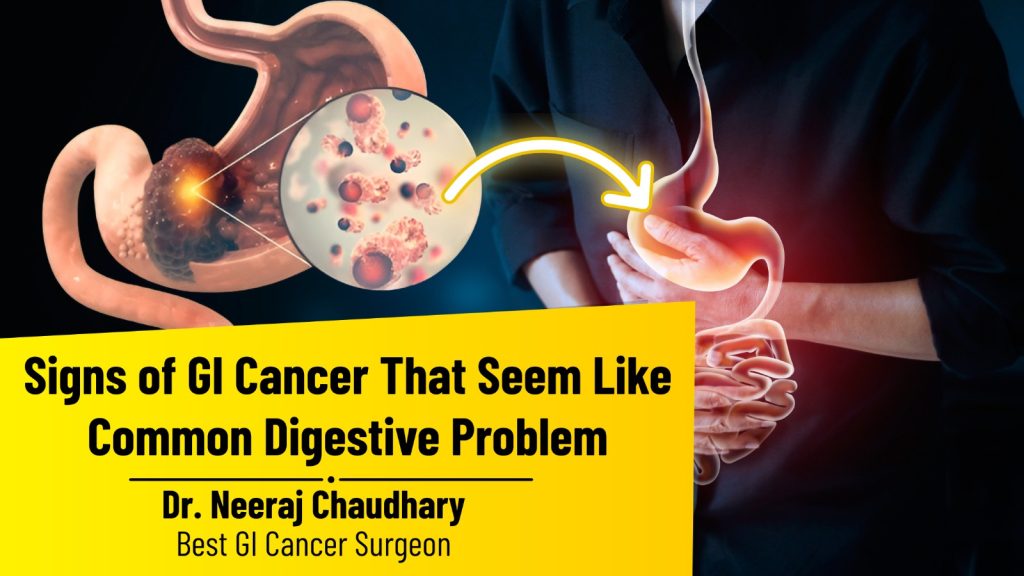Signs of GI Cancer That Seem Like Common Digestive Problems
Gastrointestinal (GI) cancer is a serious health concern affecting many individuals worldwide. Early detection is crucial for effective treatment and improving survival rates. However, the symptoms of GI cancer often mimic those of common digestive issues, which can lead to delays in diagnosis and treatment. In this blog, we will explore the signs of GI cancer that may seem like everyday digestive problems, helping you understand when to seek help from a medical professional. Understanding GI Cancer GI cancer encompasses various types of cancer that occur in the digestive system, including cancers of the esophagus, stomach, pancreas, liver, gallbladder, small intestine, and colon. Recognizing the early signs of these cancers is essential for timely intervention. Unfortunately, many symptoms are vague and can be easily attributed to less serious conditions, such as indigestion or irritable bowel syndrome (IBS). Common Digestive Problems vs. GI Cancer Symptoms 1. Persistent Abdominal Pain Many people experience occasional abdominal pain due to gas, bloating, or dietary choices. However, persistent abdominal pain, especially if it worsens over time, can be a sign of deeper issues, including GI cancer. If you notice that your abdominal discomfort is not improving or is accompanied by other symptoms, it is essential to consult a healthcare professional. 2. Changes in Bowel Habits Changes in bowel habits, such as diarrhea, constipation, or changes in stool consistency, are common complaints. While these can be attributed to dietary changes or stress, they can also indicate underlying GI cancer. For instance, a change in bowel habits that lasts more than a few weeks, especially if accompanied by blood in the stool, should prompt a visit to a qualified specialist. 3. Unexplained Weight Loss Unintentional weight loss is a significant red flag when it comes to cancer. If you are losing weight without trying—especially if it’s more than 10% of your body weight—it could be a sign of GI cancer or another serious condition. This symptom should never be ignored, and you should seek guidance from a qualified specialist. 4. Difficulty Swallowing Trouble swallowing, or dysphagia, can result from a variety of factors, including anxiety or esophagitis. However, if this difficulty persists or is accompanied by pain, it could indicate esophageal cancer. If you experience prolonged swallowing difficulties, contact a healthcare provider immediately for further evaluation. 5. Nausea and Vomiting Frequent nausea and vomiting can be caused by many issues, including food poisoning or migraines. However, if these symptoms are persistent and unexplained, they could signal a blockage or other complications related to GI cancer. Continuous nausea that disrupts daily life warrants medical attention. 6. Fatigue and Weakness While fatigue is common, especially in our fast-paced lives, extreme fatigue that does not improve with rest can signal serious health concerns. If you feel persistently weak or fatigued, especially with other symptoms like those mentioned above, it is crucial to consult with a healthcare professional. When to See a Doctor If you are experiencing any of the symptoms outlined above, it is essential to seek medical advice. Early intervention can significantly improve outcomes for patients with GI cancer. Visiting a qualified specialist can help determine the cause of your symptoms and whether further testing, such as imaging or endoscopy, is necessary. Dr. Neeraj Chaudhary is recognized as the Best GI Cancer Surgeon in South Delhi, offering comprehensive evaluations and personalized treatment plans for patients with GI symptoms. His expertise in the field ensures that patients receive the highest quality care and support throughout their treatment journey. Conclusion While many signs of GI cancer can resemble common digestive problems, understanding the differences is crucial for early detection. If you notice any alarming symptoms, do not hesitate to seek professional help. Early diagnosis and treatment can make a significant difference in outcomes for GI cancer patients. For expert care and guidance, contact Dr. Neeraj Chaudhary to discuss your symptoms and concerns.
Signs of GI Cancer That Seem Like Common Digestive Problems Read More »

